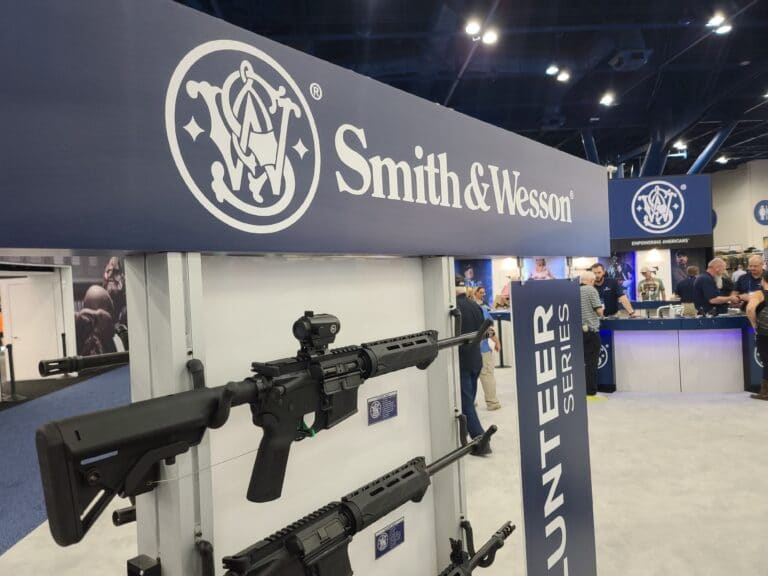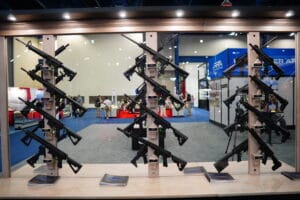The Firearms Policy Coalition (FPC) on Tuesday filed suit against New York’s “assault weapon” ban, alleging it violates the Second Amendment.
Gun-rights advocates have long argued such bans are unconstitutional. Long Island residents David Vanchoff and Andrew Cross, members of FPC, took legal action on the grounds that the banned firearms, including the AR-15, are covered by Second Amendment protections.
“The arms targeted by New York’s ban are ordinary arms, kept by ordinary people for ordinary–but extremely important–purposes, including the fundamental right to an effective self-defense,” Matthew Larosiere, FPC policy counsel, said in a statement. “There is no justification for threatening peaceable people with long stints in a government cage for merely possessing a firearm.”
The case could help to determine how the courts apply the Second Amendment to broad bans on common weapons such as the AR-15. As with the recent decision in New York State Rifle and Pistol Association v. Bruen, a loss for New York could call into question similar gun-control laws in a host of other states.
This comes as assault weapon bans are becoming less popular, even in the wake of multiple mass shootings. Recent polls show support for bans on “assault weapons” has been falling. A Quinnipiac University study last month found that support for such bans dropped 17 points since 2018 and now sits at 50 percent, the lowest number the pollster has found since it started asking in 2013.
FPC’s case leans heavily on the Court’s 2008 District of Columbia v. Heller ruling. In that case, the Supreme Court found the Second Amendment protects guns “in common use,” but it has not yet applied that principle to invalidate all bans on assault weapons, the definition of which is nebulous and varies from state to state. FPC is now going to court on the grounds that New York is illegally banning semiautomatic rifles that are in common use.
“The banned semiautomatic firearms, like all other semiautomatic firearms, fire only one round for each pull of the trigger. They are not machine guns,” the group’s legal complaint reads. “What is more, the designation ‘assault weapons’ is a complete misnomer, ‘developed by anti-gun publicists’ in their crusade against lawful firearm ownership.”
The plaintiffs also argue that the way New York defines assault weapon is a meaningless aray of restrictions intended to chip away at gun rights.
“There is no constitutionally relevant difference between a semi-automatic handgun, shotgun, and rifle,” the complaint said. “While some exterior physical attributes may differ—wood vs. metal stocks and furniture, the number and/or location of grips, having a bare muzzle vs. having muzzle devices, different barrel lengths, etc.—they are, in all relevant respects, the same.”
New York Attorney General Letitia James (D.) did not respond to a request for comment.
Similar challenges against assault weapons bans have failed in the past. However, the plaintiffs in this case said the recent Supreme Court ruling in Bruen makes these laws more vulnerable.
Josh Blackman, a professor at South Texas College of Law Houston who studies constitutional law, agreed with that assessment.
“The courts are now instructed to consider the constitutionality of gun-control restrictions by looking to history,” Blackman told The Reload. “I think it will be hard to justify bans on popular rifles, like an AR-15, as a historical matter.”
Professor Robert Lieder, who specializes in gun law at George Mason University, concurs that historical considerations will play an important role in the case.
“In the nineteenth century, courts understood the right to bear arms to protect civilian possession of militia arms.” Leider told The Reload. “Having a community of properly armed civilians preserved political liberty by promoting a decentralized military structure and by reducing the need for the government to maintain professional soldiers.”
However, Leider doubts that Bruen will change the ultimate conclusion. According to him, FPC’s case leans too heavily into the Heller case.
“The plaintiffs assert, in the language of Heller, that these weapons are commonly possessed by law-abiding citizens for self-defense against crime and for other lawful purposes,” Leider said. “If that is their theory, I think it remains unlikely that the courts will invalidate the New York assault weapons ban. Because adequate alternative weapons remain lawful, courts have upheld these laws, including state courts that have used different standards of review.”
Blackman said it may be a while before the competing theories of the case are put to the test.
“It will probably take years before these issues get back to the Supreme Court,” he said.






